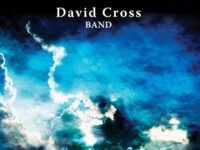Ends Meeting weaves together two very creative artists. Andrew Booker was a member of No-Man, Sanguine Hum and Peter Banks’s Harmony in Diversity. David Cross was a member of King Crimson in the early 1970s.
The two musicians went into a studio and the result is Ends Meeting, a lost project that’s now available via David Cross’s Noisy Records label. They recorded only once together, on Oct. 13, 2006, with Andrew bringing several prepared sounds and tonal themes set up on the electronic drums and David adding violin.
Ends Meeting is book-ended with two versions of “Loopscape.” “Loopscape A” is an intriguing blend of electric violin and percussion. There’s an underlying theme tinged with an Eastern influence which loops around and around, being treated differently from time to time. Cross inserts triplets into motifs to add that redolent eastern-market feel.
“The Shakes Rattled” is pretty, trinkly and light in its opening, with a deeper textural development as the piece progresses. The rhythms swing and sashay – still including an Eastern overlay, with the emphasis on the first and third – but a delay too, which gives it a kick in places. At some points, there are steady rhythms over which the violin runs riot, finding pathways to and back from the roots, and there is a sense of adventure here from both sides. The middle third is engaging, as the two musicians spar and vie for rhythmic control; eventually, the violin triumphs, because it has the benefit of the ionic and octaves.
“Sleek” states its intent from the start, with sweeping arcs of electronic movement over rock- steady rhythms set up, over which diversive lines intrude – in a good way. The sense of rolling and arches of sound is controlled and maintained by Cross’s inventive playing. “Sleek” is more of a soundscape than the previous tracks, with a deeper middle third that allows both musicians to investigate the explorative side of their creativity. The structure changes when Cross takes to a classical style for 12 bars, but this is a great insertion and aptly timed.
“Spared Bhangra” has, as the title suggests, an Indian essence to it and reflects the up-beat folk music of the Punjab in its color, texture and use of woofing in the percussion to create a tabla-like feel. It works around a short, sweet raga devised between the musicians and is a lovely number. “Worship the Gourds,” in contrast, includes a percussion-led introduction which sets up an ethereal feel. The violin then slots in, devising its own little rivulets of sound over a synthed, rhythmic slant. The violin here is given voice and in the hands of David Cross, it also gains power and wings. An interesting track and adventurous on the parts of both musicians. Rhythmic changes, shifts in direction and emphasis make “Worship the Gourds” engaging from start to finish, and the pizzicato at the end is unexpected and a little delight.
The title track is the longest piece on Ends Meeting, and it boasts a rolling introduction with a Celtic essence. The percussion rises and swoops to the surface under rivulets of sound which pour incessantly from the violin. Although this track as a whole feels gentle and almost low key, there are whispers and utterances in the music which serve to retain attention. It is slow burning and works itself into a more profound and textured middle. This section feels like it is going to rise, but never quite does. Their interest lies more in the textural development than in volume. There are wonderful warping sounds and intriguing escapades on the violin, especially toward the finish when the delivery becomes almost balladic.
“Loopscape B” finishes Ends Meeting, and serves that purpose well as it wraps the listener in sound which rises and falls to complete things.
Cross met Booker some years ago when the David Cross Band were touring with Peter Banks’s Harmony and Diversity, which featured Andrew on drums. David Cross was a member of King Crimson, but also worked with other combinations after the 1970s. He was also one of several people who introduced me to jazz.
I pitched up at the Fleet Jazz Club in Belsize Park when I first moved to London. Without my clarinet or any other instrument, I just intended to listen and take it in. Cross was having absolutely none of that, and when he realized I had been part of a band, I ended up using my voice and becoming part of the jazz club.
I eventually branched off on my own journey, but David Cross has a lot to answer for. So, there’s a little bit of bias here but also interest – because I knew him as a somewhat taciturn drummer and violin player with a talent for spotting the hidden in music. I saw him play short pieces, but never heard him in collaboration.
The pair ended up with an alluring and inventive album. There is an age to this music, a sense of rising throughout, as if prog rock is finding its way towards the light of improvisation. The combination of a very basic essence in the percussion and the modern use of electronics is intriguing. Both musicians are adventurous, to the extent that at times there is a sense of more than two players.
Andrew Booker shows that percussion is, given the right player: never just the drum section but an active and contributive part of the music. Two musicians, each creative, each inventive, what is there not to like?
Don’t forget, though, there is some bias here. David perhaps taught me to listen well.
- Milena Casado – ‘Reflection of Another Self’ (2025) - May 4, 2025
- Luis Ianes and Noel Akchote – ‘Seuil’ (2025) - April 12, 2025
- David Dower Trio – ‘Sonder’ (2025) - March 23, 2025



